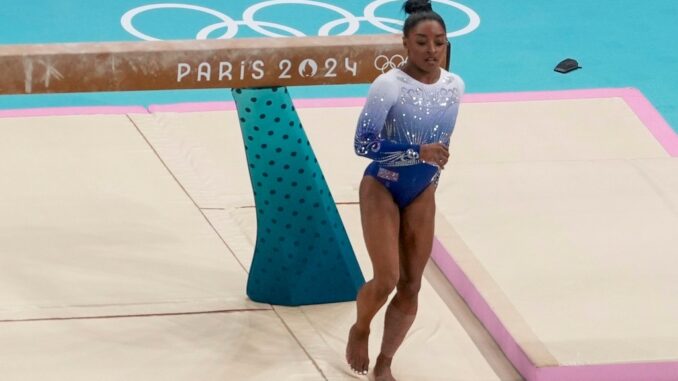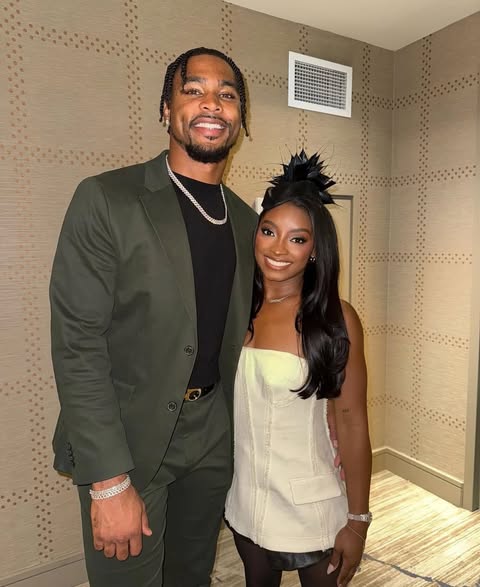
Simone Biles has issued an apology to collegiate swimmer Riley Gaines following a social media dispute involving a Minnesota high school softball team with a transgender player. Biles acknowledged that her earlier remarks were lacking in empathy and respect. Biles also criticized the current athletic system for failing to balance fairness and inclusivity, citing her dispute with Gaines.
Simone Biles isn’t just a world-class gymnast—she’s a cultural icon. So when she dipped her toe into the heated waters of the women’s sports debate, the internet practically exploded. After facing intense backlash over comments many saw as controversial, Biles issued a public apology. But this wasn’t your typical celebrity notes-app moment. It was raw, emotional, and sparked another wave of discourse. So… what did she say? Why are people still talking? And more importantly—what does this mean for women’s sports? Let’s dive deep.
The Backlash: What Sparked the Controversy
The Comments That Ignited the Firestorm
It all began when Simone Biles shared her thoughts on a trending topic in women’s athletics—possibly around gender inclusion, fairness, or the direction of women’s competitive sports. Although her intention might have been to advocate for balance and integrity, the interpretation spiraled quickly.
Social media, as it does, picked it apart. Critics said she was dismissive. Others said she was brave. The debate fractured into camps—and Biles stood right in the eye of the storm.
The Apology: What Simone Said (And Didn’t Say)
Biles’ Public Statement
In her heartfelt apology, Biles acknowledged that her words may have unintentionally hurt some fans and fellow athletes.
“I recognize that what I said may have caused pain. That was never my intention. I’m committed to learning and being more thoughtful moving forward.”
She didn’t backtrack completely—but she did show maturity by owning the impact.
Owning the Impact, Not Just the Intent
Let’s be honest. Intent doesn’t always equal impact. And Simone’s apology didn’t just center around what she said—but how it landed. That subtle distinction is a big reason why her apology resonated with many.
The Bigger Picture: The Women’s Sports Debate
What’s the Debate All About Anyway?
Women’s sports are at a crossroads. Issues like transgender athlete participation, equal pay, sponsorship disparities, and media representation dominate headlines. It’s not just about competition—it’s about fairness, visibility, and progress.
Inclusion vs. Fairness: The Tightrope
One major part of the debate revolves around how to include trans athletes while ensuring fairness for cisgender women. Athletes, coaches, fans—everyone seems to have a different opinion.
Simone’s comments—regardless of how they were intended—touched a nerve right in the middle of that tightrope.
Public Reaction: Divided, As Always
Supporters Rally Behind Her
Fans flooded her mentions with praise for being “real,” “brave,” and “willing to own her mistakes.” They viewed her apology as a learning moment and applauded her maturity.
Critics Say It Was Too Little, Too Late
On the flip side, some felt the apology didn’t go far enough. They believed she avoided specifics and didn’t address the deeper harm caused by her earlier remarks.
The Role of Celebrities in Political Sports Issues
Should Athletes Speak Out at All?
Let’s be real: sports and politics are now completely entangled. From Megan Rapinoe to LeBron James, big-name athletes are expected to use their platforms—but they walk a razor-thin line.
Simone’s Dilemma
For Biles, her massive platform is both a gift and a burden. Say nothing? Get criticized. Say something controversial? Face the fire.
The Simone Effect: Influence Beyond Gymnastics
She’s More Than Medals
With over 30 Olympic and World Championship medals, Simone Biles is arguably the greatest gymnast of all time. But beyond the flips and routines, she’s become a voice in conversations about mental health, racial equity, and now—gender and sports.
One Comment, Millions Impacted
That’s the weight of influence. One sentence can shift public opinion or deepen divides. It’s a responsibility that not every athlete signs up for—but one that comes with the territory.
How This Debate Affects Global Women’s Sports
More Than an American Issue
Simone’s apology isn’t just echoing in the U.S. Sports federations worldwide are grappling with similar questions. From rugby in the UK to swimming in Australia, the topic has gone global.
Media Fuel or Media Filter?
The role of media in either fanning the flames or contextualizing comments like Biles’ cannot be understated. Clicks and controversy often trump clarity.
Learning Moment or Cancel Culture?
Was This Another “Cancel” Moment?
Not exactly. Biles wasn’t “canceled.” But she was definitely called out. And there’s a growing difference between the two.
Growth in Public
She used the opportunity to grow in public—a vulnerable, uncomfortable thing. And that’s what gives this story its human core.
The Apology Aftermath: What’s Next for Simone Biles?
A Chance for Redemption
This controversy might have dented her reputation temporarily—but her honest apology may have also solidified her as someone who learns, adapts, and leads with humility.
Will It Affect Her Legacy?
Probably not. If anything, it adds another layer to her story—a reminder that even icons are human.
What We Can All Learn From This
-
Words matter—even when you’re famous.
-
Listening is just as important as speaking.
-
Apologizing doesn’t mean weakness—it shows strength.
-
Public figures are navigating complicated cultural waters, just like the rest of us.

Conclusion: A Flip, A Fall, and a Stand Back Up
Simone Biles made a comment. People reacted. She apologized.
But this isn’t just about gymnastics, or even women’s sports. It’s about navigating a world where identity, fairness, and influence collide.
And in that world, her apology wasn’t just about what she said—it was about showing the kind of leadership we rarely see.
FAQs
1. What exactly did Simone Biles say that caused backlash?
While the exact comment varied by interpretation, it touched on sensitive issues related to fairness and inclusion in women’s sports.
2. Did Simone Biles apologize directly to anyone?
Her apology was a public statement aimed at the broader community, acknowledging the unintended impact of her words.
3. Will this controversy impact her Olympic chances or endorsements?
Highly unlikely. Simone Biles remains a major athletic and marketable figure. This moment may actually humanize her further.
4. Why is this such a hot topic right now?
Because gender and fairness in sports are at the center of ongoing cultural conversations, and public figures’ opinions can amplify these debates.
5. What’s next for Simone Biles?
She continues to train, speak out, and inspire. This incident is a chapter—not the whole story.